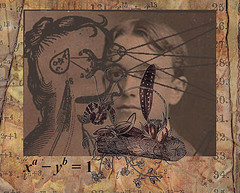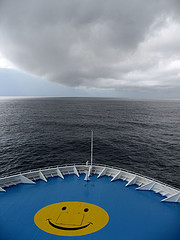Jul 28, 2009 2
The Trouble with Transparency
 Be yourself; it’s the perfect disguise. – M.L. Grim
Be yourself; it’s the perfect disguise. – M.L. Grim
I got reprimanded on Twitter the other day for equating transparency with invisibility.
For the record, I understand that “transparent” means “you can see through it,” not ” you can’t see it at all,” but that wasn’t exactly my point (though, as any bird who’s ever flown into a plate glass window will tell you, transparent objects can sometimes be devilishly hard to see at all).
Instead, I wanted to draw attention to the fact that calls for transparency in government and business, by relying on the common association of transparency with open, guileless communication, actually overlook the possibility that transparency can and often does serve as it’s opposite.
Take for example Jeremiah Owyang’s twitteration from back in April, “Do you think corporate America will ever be as transparent as the Obama administration?” I responded that I understood transparency to be a plank in Obama’s platform and an important element of his branding, intended to differentiate his administration from the blatant secrecy of Cheney’s, but I expect and encourage him to mobilize opacity whenever political or strategic necessity demands it.
Governments and corporations are not in the business of sharing their inner workings, plans, or intentions. Rather, they are all pursuing particular interests in a competitive environment where an unconditional openness would be foolhardy at best and suicidal at worst.
At the same time, game theory tells us that a measured openness, one that builds trust and facilitates alliances, can indeed be advantageous – so long as this openness is not seen as a “move,” in other words, an act which has as its conscious but obscured purpose self-interested gain, which it of course is.
Naturally, if the field is dominated by calls for transparency and everyone is rushing to “out-transparent” each other, an unapologetic secrecy becomes a legitimate, differentiating option, as we see in the case of Apple (though said secrecy is not without it’s own troubling consequences). Indeed, by clearly highlighting the extreme levels of secrecy maintained by your organization, governmental or corporate, you ultimately fulfill the new transparency imperative by being open about your closedness.
For my part, I do not place an absolute value on transparency and am immediately suspicious of anyone who wears their transparency on their sleeve. I can’t help but think, “They’re sharing so much with me. What are they hiding?
Image Courtesy of Arenamontanus.




